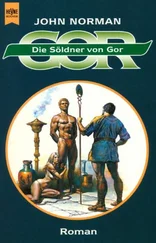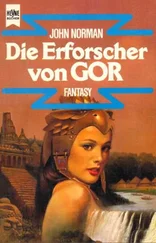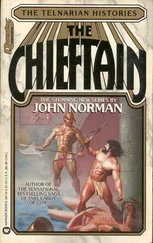The giant looked back up the street. The men who had followed them no longer followed, but stood there, remaining at a distance. It was not that they could not have followed onto the plaza, for they were not armed, and civilians were allowed on its delightful expanse, and there were several upon it now, but that they chose not to follow. The sport, perhaps, seemed no longer so inviting. The giant could see their companion, whom he had thrust, not gently, against the wall. He still lay crumpled at the foot of the wall, senseless, in his own blood. Rather near them, but not with them, was the woman. She was now standing, still clutching her leel about her. She was looking after them, after the giant, and his companion.
There was a fresh wind that, unobstructed by buildings, swept across the plaza.
“I like it better here,” said the giant.
“Oh?” said his companion.
“It does not smell so much here,” said the giant.
“It is the wind,” said his companion.
“It does not smell so much here,” said the giant, again, amused.
“No,” said his companion.
Surely this must be an allusion to the efficacy of the aromatic herbs, crashed, strewn underfoot, renewed daily in this district, the emperor in residence, as we have remarked. Such muchly covered the smell of garbage, and offal, which was considerably more obtrusive elsewhere in the small city.
“Nor are the flies so bad here,” said the giant.
“Ah,” said his companion.
“But the woman did not smell,” said the giant.
“No,” said his companion.
“But it would be otherwise,” speculated the giant, “if she were to be naked, and knee-deep in dung, her hair bound up high on her head, fearing the whip of overseers, cleaning stables.”
“Doubtless,” said his companion.
“But she could be soaked, and then scrubbed clean, and perfumed afterwards,” said the giant.
“Surely,” said his companion.
“I think she would soon beg the service of the hut, rather than that of the stables,” said the giant.
“I do not doubt it,” said his companion.
The giant looked back.
“They will not bother us further,” said the companion. “It is nearly time for the afternoon dole.”
“I no longer see her,” said the giant.
“Forget her,” said his companion.
“She was well curved,” said the giant.
“Yes,” said his companion.
In time the giant would breed slaves, choosing the best, from one point of view or another, for replication.
There were some fountains here and there in the plaza, and, also, here and there, some statues of gods, the old gods, revered, tutelary deities of the empire, but nothing which would afford much cover.
“Sir,” said the new officer of the guard, to the companion of the giant.
“Proceed,” said the companion of the giant.
The group then began to make its way across the plaza toward the palace.
The old pantheons were complex, and diverse on the many worlds, and even within the empire, from world to world, they often varied considerably. The general policy of the empire, elsewhere discussed, was one of toleration, not only for the many gods in its own pantheons and their devotees, but for those of other peoples, and species, as well. The theory of the empire seemed to be muchly to the effect that, as there were many worlds, and peoples, and species, so, too, it was likely that there were many gods. To be sure, there might be more or less powerful gods, and perhaps even a most powerful god, and wars among gods, and so on. The empire did, however, occasionally, and particularly when it became hard-pressed, or alarmed, insist on the right of reassuring itself of the allegiance of its subjects, and the gesture, or symbol, of allegiance commonly took the form of a sacrifice, usually of a token nature, such as a flower, a sprig of laurel, a pinch of incense, such things, on an altar, often one devoted to the genius , or spirit, of the empire. It was not clear, of course, that the genius , or spirit, of the empire was a god, at all. This sacrifice was normally found acceptable, and unobjectionable, by most of the empire’s subjects, spread over galaxies, except occasionally by the members of minor, deviant sects, whose unwillingness to perform the ceremony was commonly winked at.
“It is not far now,” said the companion of the giant.
The purple water of a perfumed fountain spumed upward, falling back in a shower of amethysts, forming tiny crowns as they struck the water.
As the giant and his companion, in the company of their escort, make their way across the plaza, and before they reach the first gate, in the outer wall, it may not be amiss to apprise the reader, although confessedly in the most inadequate fashion, of something of the nature of the pantheon of the empire. In it we discover various gods, such as Orak, the king; Umba, his consort; the messenger god, Foebus; Andrak, artisan and builder of ships; Kragon, hawk-winged god of wisdom and war; and the much-coveted Dira, goddess of slave girls. In the myths she had belonged, at one time or another, to various of the gods, who won her, or to whom she was given or sold. She is usually represented as being the property of Orak, the king. She is hated by Umba, the consort of the king, and by other goddesses as well. She is commonly represented as kneeling, or dancing, or humbly serving. In representations she is often seen at the feet of other gods. She is commonly represented as collared, or chained. She serves also as a goddess of love and beauty.
Our small company was now quite close to the main gate in the outermost wall, one of the more than twelve surrounding the palace.
Citizens fell back before the group, and many looked on, with some curiosity, or interest, having noted the barbarian. They saw only of course a fellow clad in skins, large, formidable in appearance, broad-shouldered, narrow-waisted, long-armed, large-headed, with keen eyes, and light hair, one who walked not like one from the empire, but rather as one from beyond its perimeters, one from another reality, one, curious and observant, feral and leonine, from farther, stranger, harsher worlds. We do not blame them, of course, nor hold them accountable. There was no reason then, you see, why anyone should have marked anything unusual or portentous in this particular barbarian. Surely he was no different countless others. Even we, had we seen him then, even we, would not have marked him, we would not have known him, we, no more than the others, would not have known who it was saw. No one, you see, knew him then.
At the small door, in the larger outer gate, the party halted.
“It will be a moment,” said the officer of the palace entering the small door.
“Ho,” said one of the guards.
The giant looked down, to his right, as he waited. There, to his surprise, holding her embroidered leel about her, that it not, torn, fall from her, knelt the woman from the street. She was kneeling, tears in her eyes, at the thigh of the barbarian. She looked up at him, timidly, fearfully. The guards looked on, puzzled.
“Get up, woman,” said the companion of the giant, irritably. “You are a citizen of the empire!”
But she did not rise. Rather, she remained as she was, clutching the leel about her, almost as in terror. As the giant had turned, to regard her, she was now, fully, at his feet, kneeling before him.
“I do not need the whip, to obey,” she said.
The giant shrugged. The use of the whip, whether needed not, was at the discretion of the master.
She looked to the side, not daring to meet his eyes.
He did not command her to open her robes.
“Whom shall I announce?” asked an attendant, returning with the officer of the palace escort.
Читать дальше












